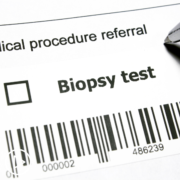What Questions Should I Ask If I Suspect Acute Myeloid Leukemia?
What Questions Should I Ask If I Suspect Acute Myeloid Leukemia? from Patient Empowerment Network on Vimeo.
As an acute myeloid leukemia (AML) patient, what questions should a patient ask if they suspect AML? Watch as expert Dr. Catherine Lai shares tests that can help rule out AML and common symptoms that may serve as warning flags to patients.
See More from Best AML Care No Matter Where You Live
Related Resources:

Are Acute Myeloid Leukemia Patients at Risk for Secondary Cancers? |

|

Acute Myeloid Leukemia, Recommended Coping Methods and Mental Health |
Transcript:
Sasha Tanori:
Dr. Lai, I think another factor that played a role in my diagnosis is somewhat being delayed is my age, I was 24 at the time, what are some questions others who suspect they have AML should ask to rule out the diagnosis?
Dr. Catherine Lai:
So, Sasha, that’s a really good question. And what I would say is that, as you are aware, the median age of AML diagnosis is 68, so not to say that we don’t have young patients…I have plenty of young patients, but it doesn’t come to…it’s not a common thing to think about in younger patients right off the bat, the other thing that contributes to that is also AML compared to other cancers is an uncommon cancer. There are only 25,000 cases of newly diagnosed in the United States per year because it’s not as common in younger patients and because it’s not that common…doctors often want to rule out other simple things rather than just going straight to a cancer diagnosis though, unfortunately, that can lead to some delays, what I would say in young patients who are healthy is that they shouldn’t have low blood counts that can’t be explained for other reasons. So I think having prompt attention in terms of if their blood counts are abnormal, to really understanding why they’re abnormal, and those are things that can be easily work up, and if all those things are ruled out, then you’re talking about doing a bone marrow biopsy I don’t like to do procedures for unnecessary reasons, but it’s one of those things that you can also…
I mean, I think if you have a physician who is the astute and is thinking about that, that you can…you can get to a diagnosis pretty quickly, I mean AML is a diagnosis in the name acute. It comes on acutely, so that means days to week, so I suspect you are probably feeling very well and over a very short prior of time felt very unwell, and you’re very in tune to your body, and that is very important because patients are smarter than we give them credit for, and so being persistent and knowing that something is wrong goes a long way. Again, I’m sorry that you had to deal with that, and I’m glad that they finally made the right diagnosis, but I think just awareness and education. While it is an uncommon disease, I think having a larger burden and strain that happens on younger patients because you haven’t been working for the majority of your life, and it takes a huge toll on what your potential is, both as a person, but economically and all sorts of things. So it’s a huge problem.










